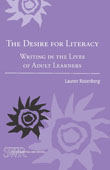This is the sixth of eight excerpts we are offering from Lauren Rosenberg’s The Desire for Literacy: Writing in the Lives of Adult Learners, a volume in the CCCC Studies in Writing and Rhetoric Series. We’ll be offering a new excerpt each Monday. In this book, Dr. Rosenberg shares the literacy experiences of four learners who attended the Read/Write/Now Adult Learning Center, a library-based informal education site in Springfield, Massachusetts.
 “Are we guinea pigs?”
“Are we guinea pigs?”
I’ve just given a simple explanation of who I am and why I’m there, but George rebuts my introduction to his class. I argue a weak “no,” (Melissa [his teacher] looks at me quizzically, as if to ask, how are you going to respond to that one?), but George’s remark has already said it: I don’t believe you, white lady. . . .
When I approached the people I hoped to work with as case study participants, the two women responded immediately with excitement, asking when we would begin. Chief, though less enthusiastic initially, said okay, it would be fine. But George, who I assumed would be willing, even forthcoming, would not make eye contact. What would he have to do, he wanted to know?
Meet with me to talk about your writing.
“Are you going to take pictures?”
No, I’m just going to talk with you, no pictures. And, I’m going to make a copy of all your writing.
“It’s not any good.”
It doesn’t have to be good. I’m just going to talk to you about your writing.
“I’ll have to think about it. I’ll let you know.”
How could this be? George’s reluctance forced me to confront myself—white, younger, literate, female—and guess at how he might rank these categories. I figured that literate trumped the others, but I worried over the way I was presenting myself to him. When I spoke with Pamela, the program coordinator, she told me it was none of that. George doesn’t want his picture taken. He doesn’t want people to see that he goes to a literacy center. He is afraid of being evaluated. It had taken him years to trust Melissa and her. And you should see how he used to resist writing. For his first few years in the program, George wouldn’t write anything. Melissa was adamant that it would be good for him to have to discuss his writing with me. So she spoke with George, he said yes, and we moved ahead, but cautiously. I was so careful preparing for George’s interview and interacting with him at the center. I wanted to do all the right things to show I was an ethical researcher who respected him. Over time I would come to understand that his frequent displays of reluctance were a performance; that he was, in fact, preoccupied with how he would appear in public, as Pamela had claimed. But at that moment, I tried to compensate for his unwillingness, as well as my own anxiety that he would show up at the interview and refuse to speak, by completely rewriting my questions to suit him. I softened them. “How can I draw him out so he won’t quit?” I asked myself again and again as I prepared for our meeting.
We are alone in the library. George asks me whether I will be publishing the interview in the newspaper. No, I assure him, nothing in the news and no photos of him, ever. He likes going over the consent form; it relaxes him a bit. I ask the first questions: “Did you attend school? Where? When?” George launches into the entire story of his education, his lack of schooling, coping with nonliteracy throughout his life, his desire to get an education in recent years. He speaks with hardly a pause for one hour, and then, “Well, I guess I gotta go now,” and we are done.
All eight of our excerpts from this book will be added here.
